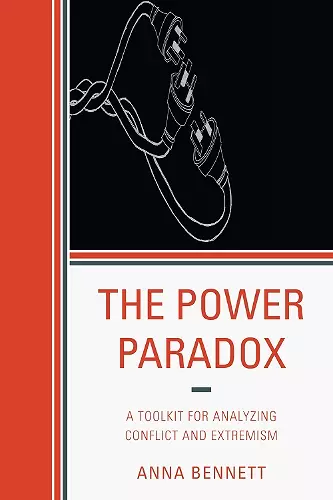The Power Paradox
A Toolkit for Analyzing Conflict and Extremism
Format:Paperback
Publisher:University Press of America
Published:13th Apr '12
Currently unavailable, and unfortunately no date known when it will be back
This paperback is available in another edition too:
- Hardback£66.00(9780761857969)

In drawing attention to the question of power, Anna Bennett shows that this has important consequences for our social existence and indeed for the manner in which we understand ourselves as subjects capable of resisting dangerous political relations. This research is valuable in showing how even discourses claiming to resist state power formations endorse a repressive view of power. The latter - ironically - limits how resistance can be conceived.-Mahmut Mutman, professor in the Department of Cinema and Television, director of the M.A. Program in Cultural Studies, Istanbul Sehir University Anna Bennett offers a creative and defensible intervention into an expanding debate that has been generated by sociological work on power.-George Pavlich, professor of law and sociology, University of Alberta, Canada
The Power Paradox reveals how mainstream views of power restrict the conceptual insights needed to resolve conflict. Bennett identifies fascinating contradictions within discourses of power and relational dynamics, acknowledging the enduring quandary of power struggles: we are all implicated within them.The Power Paradox: A Toolkit for Analyzing Conflict and Extremism reveals how mainstream views of power restrict the conceptual insights needed to resolve conflict. Anna Bennett insightfully explores Michel Foucault’s work on power and discourse in order to advance conceptual and contextual tools for understanding power dynamics. Through an examination of a range of extremist, terrorist, and counter-terrorist rhetoric, as well as various theories of power, Bennett analyzes the widespread problems associated with assuming that power is only repressive and competitive. This limited view reinforces — often unwittingly — divisive dynamics and stubborn polemics, which serve to continue conflict. By offering a comprehensive and constructive view of power struggles, The Power Paradox argues that power is a relational dynamic. Bennett identifies fascinating contradictions within discourses of power and relational dynamics, acknowledging the enduring quandary of power struggles: we are all implicated within them.
An interesting thesis about the influence of what the author terms as a society’s 'power dynamics' in shaping the way conflict and extremism are analyzed. In the book’s first part, the author bases her conceptual framework on Michel Foucault writings on power and discourse, where she finds that mainstream views of power relations, especially where power is used repressively, tend to restrict the conceptual insights needed to resolve conflict, whereas in situations where power is used progressively, there is greater understanding of how such conflicts can be resolved. In the book’s second part, this conceptual framework is applied to examining the case studies of American far right militias, the Branch Davidian standoff against the FBI in Waco, Texas, Pauline Hanson’s far-right and anti-government party in Australia, Theodore Kaczynski (the Unabomber), and the United States-led 'war on terrorism.' The author is a teacher of foundational sociology at the University of Newcastle, Australia. * Perspectives on Terrorism *
ISBN: 9780761857976
Dimensions: 230mm x 152mm x 10mm
Weight: 245g
168 pages